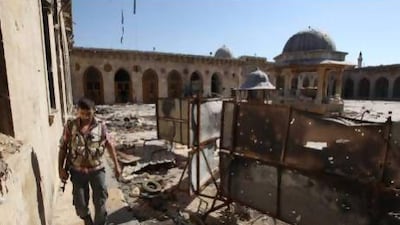NEW YORK // Russian experts have determined that Syrian rebels made sarin nerve gas and used it in an attack outside Aleppo in March, but the US has rejected their claims.
International analysts have said a March 19 chemical weapon attack occurred in the Aleppo suburb of Khan Al Assal.
Russia's UN ambassador, Vitaly Churkin blamed a Syrian rebel group linked to Al Qaeda for the attack, but the rebels have blamed the government.
"We have yet to see any evidence that backs up the assertion that anybody besides the Syrian government has the ability to use chemical weapons, (or) has used chemical weapons," White House spokesman Jay Carney said.
Samples taken on site at the invitation of the Syrian government showed that the sarin gas was "not industrial" quality, but rather produced recently in "cottage industry" conditions, Mr Churkin said after delivering an 80-page report to the UN secretary general, Ban Ki-moon.
The Syrian government has refused to let a UN inspection team into the country, but this week invited UN officials for talks on launching an investigation.
Mr Churkin said the Russian inquiry had established that rebel forces had fired a Bashar 3 missile at the town, killing 26 people including 16 troops.
Britain, France and the United States said they have given evidence to UN experts that the forces of the Syrian president, Bashar Al Assad, had used chemical weapons in the 26-month-old conflict.
At least 100,000 people have been killed in Syria since the uprising against Mr Al Assad began in March 2011.
Some Arab countries and the US have agreed to arms the rebels, who have suffered heavy losses on the battlefield this year.
In a possible setback in arming the rebels, the top Republican on the US senate foreign relations committee said yesterday that the White House was harming US national security interests by being too secretive about its plans to arm rebels.
Senator Bob Corker said that the administration of the US president, Barack Obama, had fully briefed only the members of the senate and house of representatives intelligence committees on details of its plans to aid to rebels.
There were reports on Monday that members of both intelligence panels had expressed reservations behind closed doors about the effort to arm the rebels and were holding up the delivery of the weapons.
Sources said members were worried that the weapons would not be enough to tip the balance in the conflict and that the arms could end up in the hands of Islamic militants.
"It is unacceptable to hide such a fundamental foreign policy matter from the vast majority of congress and the American people," Mr Corker said. "This approach is not appropriate and it just wastes time at the expense of our national interests."
Mr Corker was the co-author of a bill that called on the US to arm the Syrian rebels, which the foreign relations committee passed by a strong margin in May but has yet to come to the full senate for a vote.
Some congressional aides attributed the delay to concern that there might not be enough support for the bill for it to pass through the 100-member body.
Separately, two other senators called for the US to increase military pressure on Mr Al Assad's government, after a trip to Turkey and Jordan to study the situation in Syria.
The senators, Carl Levin and Angus King, called on the US and other members of the "London 11", which includes the UAE and the other countries that met in Qatar in June to discuss Syria, to convene a meeting to plan for additional measures to increase pressure on Mr Al Assad's government.
"Advancing the goal of a political settlement will require actions to change the military dynamic in Syria and convince the Assad regime and its supporters that momentum is not on their side and that their best option is a political solution," the two senators said.
Meanwhile, the new head of the Syrian National Coalition, Ahmad Assi Jarba, has backed calls from Mr Ban for a truce during Ramadan.
Mr Jarba, who was elected on Saturday to the post at the head of the main opposition to Mr Al Assad's regime, said he hoped all parties in the civil war would abide by any truce.
"We certainly welcome this call," he said after a meeting in Ankara with the Turkish foreign minister, Ahmet Davutoglu.
Mr Jarba said he was especially concerned about the humanitarian situation in Homs, in central Syria, which has been the scene of heavy fighting. "We had asked for a ceasefire on the first day of Ramadan because of the current situation in Homs," he said.
Mr Jarba said that maintaining the truce was only possible if "Syria's allies exerted pressure on the regime".
Mr Ban on Monday called on all parties in Syria to "to stop fighting and offer this month of peace as a collective present to their people".
* Reuters with additional reporting Agence France-Presse and Associated Press

